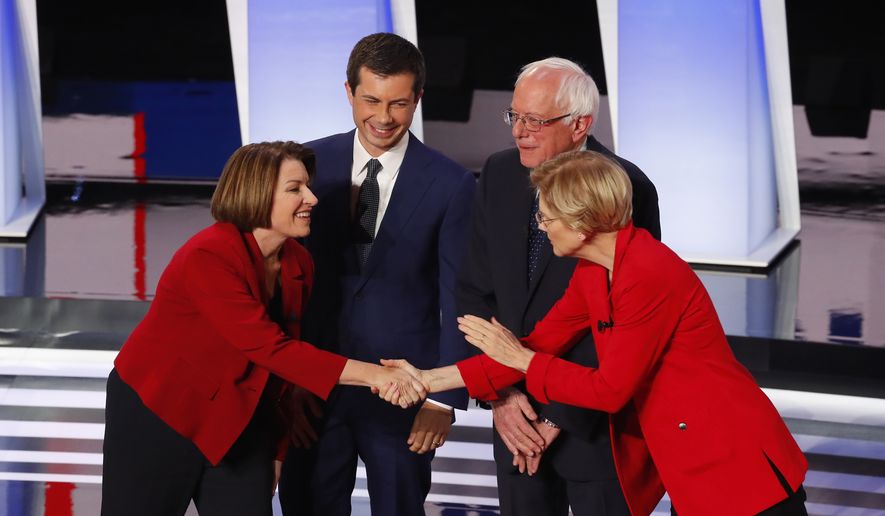OPINION:
Live by the identity-politics sword, die by the identity-politics sword. The Democrats are learning that the hard way.
With Sen. Kamala Harris of California having pulled out of the party’s 2020 presidential field last week, Democrats are wringing their hands and agonizing at the very real prospect that all of the participants in their upcoming candidates’ debate, next week in Los Angeles, will be — horror of horrors!— monochromatic. That is to say, only caucasians.
Unless former HUD Secretary Julian Castro, who is Hispanic, and/or Sen. Cory Booker of New Jersey, who is black, can meet by 11:59 p.m. Thursday, the polling and fundraising thresholds required to qualify to take part, there will be no “people of color” (“POCs” as the “woke” identitarian left calls them) on the debate stage.
As of this writing, Rep. Tulsi Gabbard of Hawaii and entrepreneur Andrew Yang are on the bubble for qualifying for the debate. Both are of Asian descent, but despite their status as minorities, curiously there appears to be no similar angst among Democrats over whether they will make the cut.
Regardless, the prospect of a “POC”-free debate is a profound embarrassment for a party that worships at the altar of diversity in its many forms — except for diversity of thought, the one area where diversity actually matters. Democratic social justice warriors and liberal talking heads are fit to be tied, but there’s more than a bit of schadenfreude to be had in watching them wrap themselves around their own axles over it.
As of now, six candidates have qualified for the party’s Dec. 19 face-off: former Vice President Joe Biden; Sens. Bernie Sanders of Vermont, Elizabeth Warren of Massachusetts and Amy Klobuchar of Minnesota; Mayor Pete Buttigieg of South Bend, Indiana.; and billionaire environmental extremist Tom Steyer. All are severely melanin-challenged.
“I’m a little angry, I have to say, that we started with one of the most diverse fields in our history, giving people pride,” Mr. Booker said after Ms. Harris’ Dec. 3 exit. He added a jab clearly aimed at Mr. Steyer and at media mogul Michael Bloomberg (even though the latter won’t be debating): “I don’t understand how we’ve gotten to this place, where there’s more billionaires in the race than there are black people.”
Ever the racial arsonist, Al Sharpton jumped in, contending that Ms. Harris had been “treated badly” and “held to a different standard” than others. “What are you going to say to black voters when they look at that stage, and nobody like them are there?” he said. “The Democratic Party’s going to have to look at that and deal with that, because that is a problem.”
Other Harris supporters blamed a bigoted American electorate, rather than what observers charitably described as “organizational problems” with her campaign or her abrasive personality for her candidacy’s failure to catch fire. Rep. Marcia Fudge, Ohio Democrat, who is black, said the “dismissal by so many people” of Ms. Harris was “nothing more than misogynistic, as well as in some respects quite racist.”
That’s a cop-out and a canard, of course, because this isn’t the general election; it’s still only the party-nomination process. Ms. Harris’ candidacy wasn’t rejected by the U.S. electorate at large, but rather by Democrats who apparently didn’t think she would be the best nominee to send up against President Donald Trump next November.
The same can be said about Mr. Booker, whose playing of the race card is political sour grapes. That Barack Obama was able to win the presidency twice belies the charismatically challenged Mr. Booker’s ludicrous implication of racism as accounting for his (and Ms. Harris’) inability to gain traction even among Democrats.
We are left to conclude that Ms. Harris and Mr. Booker expect Democrats’ obsession with affirmative action to be extended even to the party’s presidential-nomination process, regardless of the lack of support for them among Democratic partisans. To that end, some say the primary and caucus schedule should be altered because the populations of the lead-off states of Iowa and New Hampshire are not diverse enough racially and ethnically.
Others argue that the party should change its debate-participation criteria, which they say exclude supposedly “serious” candidates like Mr. Booker, while rewarding “non-serious” ones like Mr. Steyer, who they say can buy support with massive ad campaigns.
They say Democrats should either lower debate-participation thresholds or eliminate them entirely, but that risible recommendation only calls to mind the title of a 1968 Jerry Lewis slapstick-comedy film, “Don’t Raise the Bridge, Lower the River.”




Please read our comment policy before commenting.